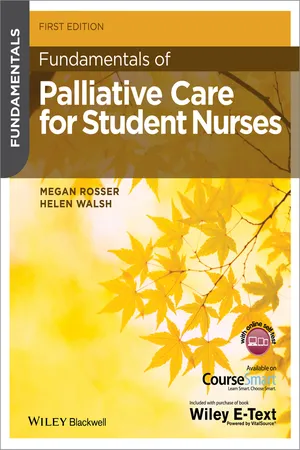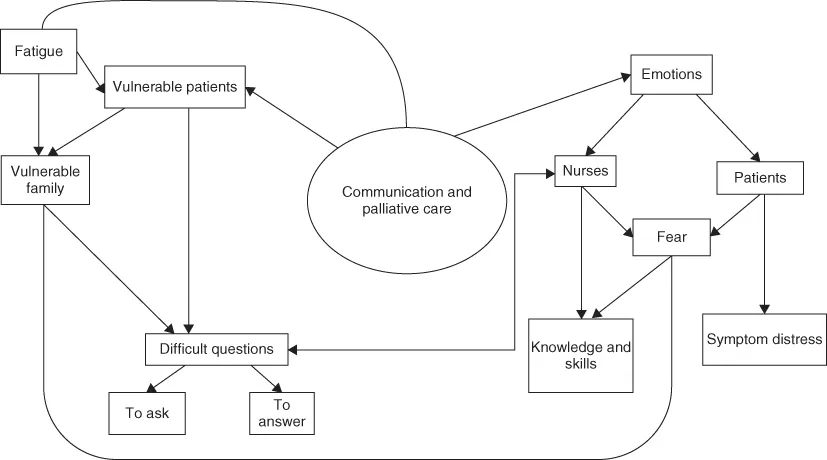
- English
- ePUB (mobile friendly)
- Available on iOS & Android
eBook - ePub
Fundamentals of Palliative Care for Student Nurses
About this book
Fundamentals of Palliative Care for Student Nurses is a thorough yet accessible introduction and overview of a key area of the nursing programme. This textbook clearly explains the palliation of symptoms and the social context of death and dying. Engaging with the latest guidelines and curriculum, it highlights the practical and communicative skills required for induction programmes and continuing professional development.
KEY FEATURES:
- A full-colour, student-friendly, introduction to the essentials of palliative, or end of life care
- A topical and timely subject area, explored clearly and concisely
- Full of interactive pedagogy and features, including quizzes, multiple choice questions, vignettes/case studies and activities
- Features a companion website with links to further reading, additional activities and resources, and self-testing interactive multiple choice questions
Fundamentals of Palliative Care for Student Nurses focuses on this area with expert knowledge and compassion, preparing students in order to help them provide the best possible care for their patients and their families.
Frequently asked questions
Yes, you can cancel anytime from the Subscription tab in your account settings on the Perlego website. Your subscription will stay active until the end of your current billing period. Learn how to cancel your subscription.
No, books cannot be downloaded as external files, such as PDFs, for use outside of Perlego. However, you can download books within the Perlego app for offline reading on mobile or tablet. Learn more here.
Perlego offers two plans: Essential and Complete
- Essential is ideal for learners and professionals who enjoy exploring a wide range of subjects. Access the Essential Library with 800,000+ trusted titles and best-sellers across business, personal growth, and the humanities. Includes unlimited reading time and Standard Read Aloud voice.
- Complete: Perfect for advanced learners and researchers needing full, unrestricted access. Unlock 1.4M+ books across hundreds of subjects, including academic and specialized titles. The Complete Plan also includes advanced features like Premium Read Aloud and Research Assistant.
We are an online textbook subscription service, where you can get access to an entire online library for less than the price of a single book per month. With over 1 million books across 1000+ topics, we’ve got you covered! Learn more here.
Look out for the read-aloud symbol on your next book to see if you can listen to it. The read-aloud tool reads text aloud for you, highlighting the text as it is being read. You can pause it, speed it up and slow it down. Learn more here.
Yes! You can use the Perlego app on both iOS or Android devices to read anytime, anywhere — even offline. Perfect for commutes or when you’re on the go.
Please note we cannot support devices running on iOS 13 and Android 7 or earlier. Learn more about using the app.
Please note we cannot support devices running on iOS 13 and Android 7 or earlier. Learn more about using the app.
Yes, you can access Fundamentals of Palliative Care for Student Nurses by Megan Rosser,Helen Walsh in PDF and/or ePUB format, as well as other popular books in Medicine & Nursing Skills. We have over one million books available in our catalogue for you to explore.
Information
Part II
The practice of palliative care
Chapter 6
Communication in palliative care
Introduction
According to Smith and Field (2011), effective communication skills are the most essential requirements of a nurse. Effective communication skills are consistently identified by patients and their families as the most important aspect of palliative care (Parker et al., 2007). Betcher (2010) points out that quality palliative care depends on the nurse learning about each patient and family as individuals, identifying his/her own unique needs, goals and expectations. Unless nurses use effective communication skills they are unlikely to deliver effective patient-centred quality care to this vulnerable group of patients.
Communication is a complex two-way process, which requires messages to be sent from one individual to at least one other person. These messages can relate to words, feelings or thoughts. If we do not understand the messages patients are sending, how can we accurately assess and meet their needs? More importantly, if they do not understand the messages we are sending to them, how can we expect them to co-operate in their treatment?
This chapter begins by examining the importance of communication in palliative care before exploring a simplistic, theoretical explanation of communication. The importance of self-awareness will be identified, followed by an exploration of key communication skills, the facilitators and barriers to effective communication. The chapter concludes with a brief discussion regarding the challenges of communicating with groups who have particular needs.
Learning outcomes
By the end of this chapter you should be able to
- identify the reasons why communication is important in palliative care;
- discuss fundamental communication theory;
- recognise the importance of self-awareness;
- identify key communication skills;
- recognise facilitators of, and barriers to, good communication; and
- consider the challenges in communicating with patients with particular needs.
Activity 6.1
- Think of an occasion where you have been involved in a communication interaction with one other person. This may have occurred in a professional or social setting. What do you think made the interaction go well? Now think of a time when the communication interaction did not go so well. What made this interaction less successful? You may like to create two lists which may be similar to those in Table 6.1.
Table 6.1 Characteristics of successful and unsuccessful communication interactions.
| Successful communication | Less successful communication |
| Appropriate non-verbal communication Good eye contact Good body language Common understanding, interest and purpose Felt, listen to and valued Common language No distractions Purpose of interaction understood and achieved Suitable environment Plenty of time No interruptions Appropriate humour Felt good afterwards Satisfactory conclusion | Other person did not seem interested Other person interrupted me Lack of eye contact Terms and words used that I did not understand Differing understanding Talked over or my point of view ignored Did not feel valued Felt rushed Felt ignored Lack of time Distracting environment Different language Defensive body language − a bit threatening No common understanding Unsatisfactory conclusion |
The importance of communication in palliative care
Activity 6.2
- Just spend a few minutes identifying why you think communication is important in palliative care? Jot down key words, maybe developing a mind map which you can add to as you work through the chapter. Compare your answer to the points raised in Figure 6.1.

Figure 6.1 Mind map of the importance of communication in palliative care.
Of all health care professionals, nurses spend the most time with patients and it is often during times when receiving personal care that the patient may ask questions about his/her future prognosis, for example,. ‘When am I going to get better?’ or ‘Am I dying nurse?’ As the timing and nature of these questions cannot be anticipated it is difficult to plan a response in advance. If the nurse fails to respond in a way which encourages and facilitates discussion then the true situation may be ignored, becoming the ‘elephant in the room’ – something unavoidable, impossible to dismiss, but not acknowledged (Griffie et al., 2004).
Griffie et al. (2004) goes on to challenge nurses with three key tasks to help prevent this situation arising:
- to create an environment that facilitates communication;
- to enable two-way communication between the patie...
Table of contents
- Cover
- Titles of related interest
- Dedication
- Title Page
- Copyright
- About the series
- The Authors
- Acknowledgements
- Preface
- About the companion website
- Section I: The principles of palliative care
- Section II: The practice of palliative care
- Section III: Personal and professional development in palliative care
- Index
- End User License Agreement